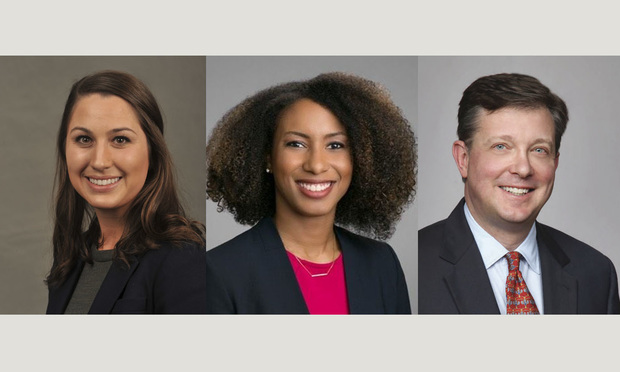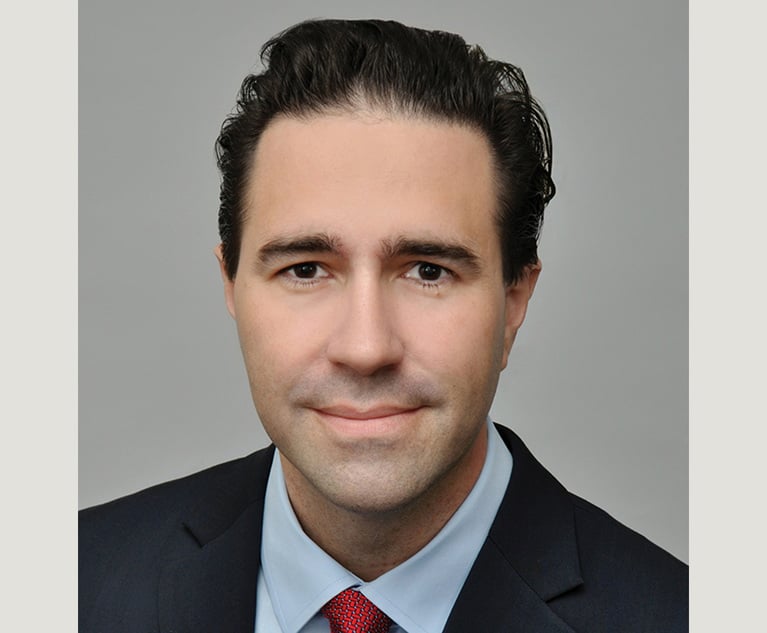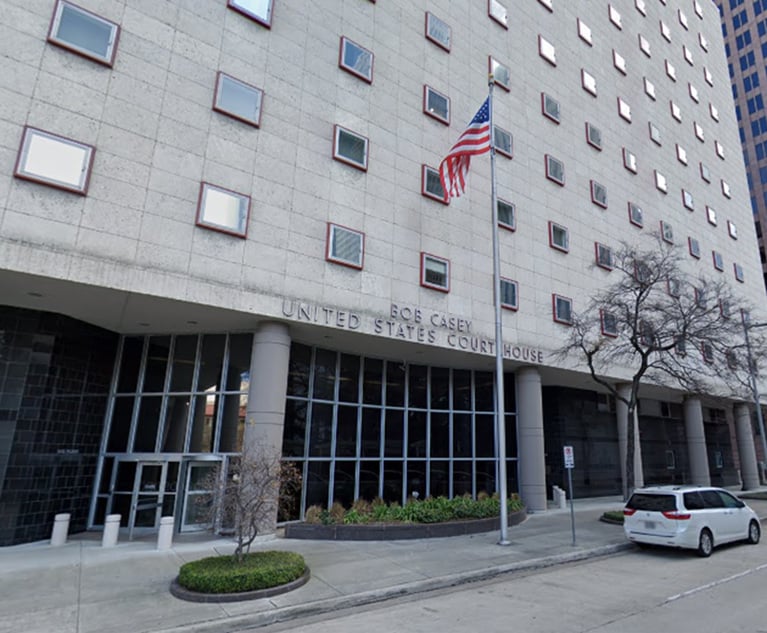Social Distancing a Litigant's Rights: Court Reopening Considerations in the Age of COVID-19
The intriguing question is not whether the problems will be solved—they undoubtedly will, as they always have—but to what extent the solutions become the new status quo.
July 06, 2020 at 06:15 PM
9 minute read
 (l-r) Associates Samantha Darnell and Kim Daily, and partner Ron Zdrojeski of Eversheds Sutherland/courtesy photos
(l-r) Associates Samantha Darnell and Kim Daily, and partner Ron Zdrojeski of Eversheds Sutherland/courtesy photos
The new reality created by the COVID-19 pandemic presents a fresh set of challenges for litigants. For appellate litigation, the U.S. Supreme Court has demonstrated that judicial proceedings can continue. Though very traditional, the Supreme Court has successfully adapted its procedures to accommodate present circumstances by allowing oral argument to be heard via teleconference.
But unlike the Supreme Court, district courts have the added elements of juries and witnesses that must be considered on reopening. Given the significant differences between trial and appellate courts, the Supreme Court's seemingly smooth transition to virtual judicial proceedings should not lull litigants into thinking that the virtual option is a sufficient substitute. In addition to the myriad constitutional and due process issues that would arise from conducting criminal trials remotely, there are several practical concerns that litigants should consider as judicial operations resume, both virtually and in person.
Jury trials are inherently social endeavors. In the pre-COVID-19 world, lawyers were able to connect with jurors through nonverbal signals such as smiling. If a juror smiled at favorable testimony, the lawyers were able to observe and note that. But if in-person jury trials are to proceed under social-distancing guidelines with jurors and lawyers covering their mouths with masks, nonverbal communication is limited.
Consider the case of United States v. Tanner, Texas' first federal jury trial since the COVID-19 outbreak. On June 1, 40 potential jurors reported to the U.S. District Court for the Northern District of Texas, where voir dire was conducted in shifts in the jury assembly room. After jury selection, the chosen jurors took turns accessing the elevator to reach the courtroom, as no more than two people were allowed in the elevator at a time. Instead of sitting in the tight quarters of the jury box, the jurors social-distanced across the gallery. Plexiglas windows separated the jurors from the lawyers (whose tables were turned to face the jury), as well as the lawyers from the testifying witness (who sat in the jury box).
Since social distancing requires gallery seating to be reserved for jurors, the court installed a camera in the courtroom to allow the proceedings to be viewed live from another courtroom. And instead of deliberating in a relatively small jury room, jury deliberations were conducted in yet another spaced-out courtroom.
Perhaps like many future trials, the Tanner trial proceeded over Timothy Tanner's public-health objections. The court was not persuaded by Tanner's argument that an in-person jury trial presented a "grave and imminent threat to public health." And while due process concerns abound considering the demographics of potential jurors who have medical conditions that put them at a higher risk of contracting COVID-19 (nonwhite people, especially African Americans), the Tanner case provides a glimpse into how an in-person jury trial may proceed in the age of COVID-19. Surely, proceedings will be slower. Jury pools will be smaller. And given the need for large amounts of space, fewer trials will be able to be heard. In response, courts may encourage more instances of alternative dispute resolution. Likewise, clients may prefer alternative dispute resolution if it means their case may be resolved significantly sooner.
For the most part, state courts have suspended their civil and criminal jury trials until late summer. But how long might justice be delayed? While civil litigants do not have the right to a speedy trial afforded criminal defendants, there are other concerns at stake.
Because the physical health risk and the cost of mitigating that risk is so high for in-person proceedings, it is prudent to consider the feasibility of conducting judicial proceedings remotely instead. But remote proceedings, like in-person proceedings, raise serious questions about equity, access, and the notion of a jury of one's peers. As online K-12 schooling during the outbreak has already demonstrated, moving jury trials online automatically excludes a portion of the community disproportionately affected by the intersections of race and socioeconomic status. Some would-be jurors do not have computers, access to reliable internet connections, private spaces within the home, or sufficient child care options to allow jury participation. If such a significant number of people cannot serve as remote jurors, how can one argue a litigant's jury pool reflects a cross section of his, her or their community?
In addition to due process concerns, remote proceedings also present significant logistical hurdles. As the Supreme Court has so deftly demonstrated, it is possible to make an argument and answer questions virtually. But how much communication is lost when a listener is unable to see the body language of the speaker, and the speaker is unable to see the body language and expression of the listener? It is much easier to comprehend that listeners are engaged or bored or annoyed when you can see them leaning forward or slumped or scowling, than it is when only their faces are visible in a small square on your screen.
Under ordinary circumstances, litigants generally have a strong preference for conducting even pretrial discovery in person to best determine credibility. One should wonder how effective a trial might be if all exchanges occur virtually. Can a judge or juror accurately evaluate whether a person is credible based on a video or phone conversation? While an argument can be made that virtual testimony is as effective as deposition excerpts played during a trial, several more arguments can be made that deposition testimony at trial is not as persuasive as in-person testimony.
Further, will judges and juries trust that a witness is not being coached by someone standing off-camera or messaging them online? Should they trust that a witness is not being coached? Without an entire courtroom holding all parties accountable, it is much easier to clandestinely communicate with a witness, inadvertently or intentionally.
Just as it will be more challenging for an attorney to judge the reaction of a judge or juror to a witness or argument, it will similarly be challenging for a judge and the judge's staff to control the virtual courtroom. Bailiffs play an important role in ensuring that jurors are in place on time. And court reporters have a critical role in maintaining the record. A court reporter, attorney, or juror missing just one word of testimony due to a choppy internet connection may seriously impact the outcome of a case. Ensuring the uninterrupted attendance of individuals who are dealing with their daily distractions at their remote locations will likely be a challenge.
As we have all come to know during this time, distractions at home can interrupt even the most diligent person. Since all listeners will need to be muted to prevent echoes and other audio issues, there will be jurors who are not heard by the judge. A judge will be unable to tell if there is construction noise or a barking dog that prevents a juror from hearing testimony. Identifying when such interference occurs will be challenging, and it seems nearly impossible that jurors will be able to find quiet locations where they will be able to listen to hours, much less multiple days, of virtual courtroom testimony without interruption.
Finally, even aside from the particular requirements for jury deliberations imposed by different jurisdictions, will confidential virtual jury deliberations be possible? A juror who is unable to find a private space could use headphones to listen to the trial and even listen to other jurors during deliberation. But if a juror does not have a private space, she will not be able to voice her opinion during jury deliberations without being heard by those physically around her.
Still, even in the midst of COVID-19 concerns, cases will be heard and verdicts will be rendered. Just as parties have grown accustomed to playing deposition excerpts in court, showing video evidence on projectors, and even communicating with witnesses located in another room (as is the case in some child abuse proceedings), attorneys will continue to adapt to new ways to communicate with jurors and the court.
These are just a sample of the challenges that litigants and courts will need to address as judicial proceedings resume. The intriguing question is not whether the problems will be solved—they undoubtedly will, as they always have—but to what extent the solutions become the new status quo.
Samantha Darnell, an associate at the Atlanta office of Eversheds Sutherland, advises corporations on all aspects of their complex business and civil litigation matters. She can be reached at [email protected].
Kimberly Daily, an associate at the Houston office of Eversheds Sutherland, advises clients on all aspects of litigation with a focus on complex commercial and energy disputes. She regularly represents energy, chemical, and transportation companies in breach-of-contract disputes and other general business litigation matters. She can be reached at [email protected].
Ronald Zdrojeski is a partner at the New York office of Eversheds Sutherland, and the co-head of the firm's (U.S.) global litigation group. His practice focuses on counseling and defending businesses in complex commercial litigation, including market manipulation, fraud and other white-collar matters. Zdrojeski has litigated in 48 of the country's 50 states, defending Fortune 500 companies, insurers and corporate officers in criminal and civil investigations, including class action, toxic tort, trade secret, intellectual property, environmental and maritime litigation. He can be reached at [email protected].
This content has been archived. It is available through our partners, LexisNexis® and Bloomberg Law.
To view this content, please continue to their sites.
Not a Lexis Subscriber?
Subscribe Now
Not a Bloomberg Law Subscriber?
Subscribe Now
NOT FOR REPRINT
© 2025 ALM Global, LLC, All Rights Reserved. Request academic re-use from www.copyright.com. All other uses, submit a request to [email protected]. For more information visit Asset & Logo Licensing.
You Might Like
View All
Houston-Based Law Firm Overcomes Defamation Suit for Website Warning
3 minute read
Houston Law Firm Files $250K Breach of Contract Suit Against 2 Former Lawyers
3 minute read

Texas Bankruptcy Judge Withdraws Ethics Complaint Against Jackson Walker
2 minute readLaw Firms Mentioned
Trending Stories
- 1Eight Years On, A&O Shearman’s Fuse Legal Tech Incubator is Still Evolving
- 2Google Makes Appeal to Overturn Jury Verdict Branding the Play Store as an Illegal Monopoly
- 3First Amendment Litigator Returns to Gibson Dunn
- 4In Record Year for Baker Botts, Revenue Up 11.8%, PEP Up 17.6%
- 5Loopholes, DNA Collection and Tech: Does Your Consent as a User of a Genealogy Website Override Another Person’s Fourth Amendment Right?
Who Got The Work
J. Brugh Lower of Gibbons has entered an appearance for industrial equipment supplier Devco Corporation in a pending trademark infringement lawsuit. The suit, accusing the defendant of selling knock-off Graco products, was filed Dec. 18 in New Jersey District Court by Rivkin Radler on behalf of Graco Inc. and Graco Minnesota. The case, assigned to U.S. District Judge Zahid N. Quraishi, is 3:24-cv-11294, Graco Inc. et al v. Devco Corporation.
Who Got The Work
Rebecca Maller-Stein and Kent A. Yalowitz of Arnold & Porter Kaye Scholer have entered their appearances for Hanaco Venture Capital and its executives, Lior Prosor and David Frankel, in a pending securities lawsuit. The action, filed on Dec. 24 in New York Southern District Court by Zell, Aron & Co. on behalf of Goldeneye Advisors, accuses the defendants of negligently and fraudulently managing the plaintiff's $1 million investment. The case, assigned to U.S. District Judge Vernon S. Broderick, is 1:24-cv-09918, Goldeneye Advisors, LLC v. Hanaco Venture Capital, Ltd. et al.
Who Got The Work
Attorneys from A&O Shearman has stepped in as defense counsel for Toronto-Dominion Bank and other defendants in a pending securities class action. The suit, filed Dec. 11 in New York Southern District Court by Bleichmar Fonti & Auld, accuses the defendants of concealing the bank's 'pervasive' deficiencies in regards to its compliance with the Bank Secrecy Act and the quality of its anti-money laundering controls. The case, assigned to U.S. District Judge Arun Subramanian, is 1:24-cv-09445, Gonzalez v. The Toronto-Dominion Bank et al.
Who Got The Work
Crown Castle International, a Pennsylvania company providing shared communications infrastructure, has turned to Luke D. Wolf of Gordon Rees Scully Mansukhani to fend off a pending breach-of-contract lawsuit. The court action, filed Nov. 25 in Michigan Eastern District Court by Hooper Hathaway PC on behalf of The Town Residences LLC, accuses Crown Castle of failing to transfer approximately $30,000 in utility payments from T-Mobile in breach of a roof-top lease and assignment agreement. The case, assigned to U.S. District Judge Susan K. Declercq, is 2:24-cv-13131, The Town Residences LLC v. T-Mobile US, Inc. et al.
Who Got The Work
Wilfred P. Coronato and Daniel M. Schwartz of McCarter & English have stepped in as defense counsel to Electrolux Home Products Inc. in a pending product liability lawsuit. The court action, filed Nov. 26 in New York Eastern District Court by Poulos Lopiccolo PC and Nagel Rice LLP on behalf of David Stern, alleges that the defendant's refrigerators’ drawers and shelving repeatedly break and fall apart within months after purchase. The case, assigned to U.S. District Judge Joan M. Azrack, is 2:24-cv-08204, Stern v. Electrolux Home Products, Inc.
Featured Firms
Law Offices of Gary Martin Hays & Associates, P.C.
(470) 294-1674
Law Offices of Mark E. Salomone
(857) 444-6468
Smith & Hassler
(713) 739-1250






